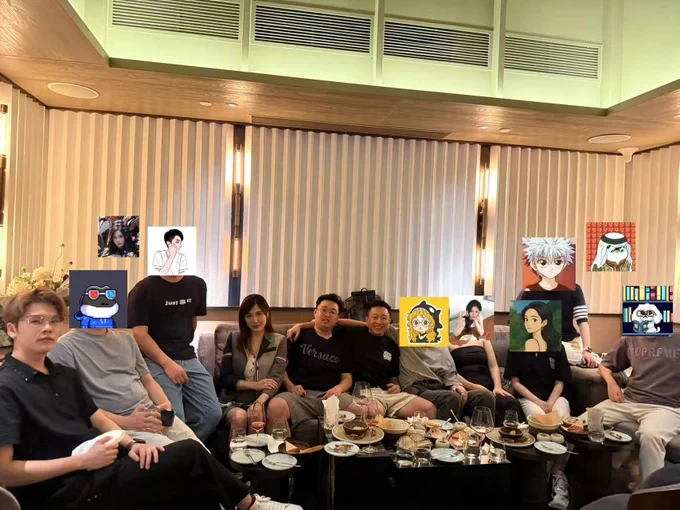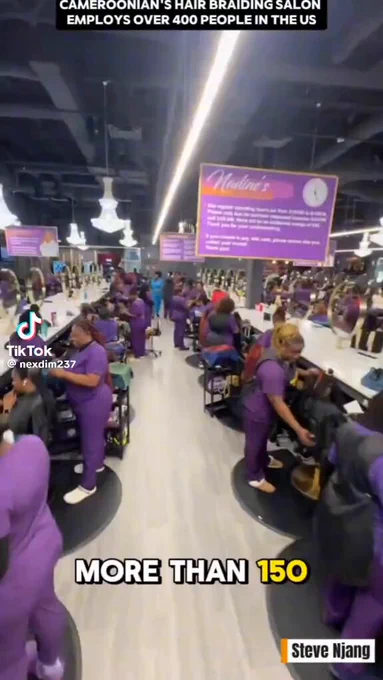Search results for Branding
People
Not Found
Tweets including Branding
Branding does not always match reality https://t.co/PUhHw0Ga8i

0
0
44
460
86
Branding your family business | Family Business Magazine https://t.co/QqX9znV2Wy #FamilyBusiness# #DigitalTransformation#
0
0
0
0
0
Personal branding https://t.co/cvU7oB16r8

0
0
29
172
9
Freeze branding is becoming the new popular trend https://t.co/I9tW8obY8A

0
0
319
4K
226
KOL Rel 逐渐会成为项目方的标配岗位;配置 InHouse 的 KOL 营销网络会成从交易所扩展至机构和大型项目方——参加Animoca 饭局的两个小感悟。
1、 昨天 @bocaibocai_ 入职项目方 @pharos_network 做 RWA 亚太战略负责人,其KOL 身份和部分工作或也会和KOL Rel 相关。
之前媒体同时掌握品牌、流量和话语权的时代,PR Branding 是项目方标配岗位。
后来 Dev 成为币圈重要Build 力量,开发者活动、黑客松等也成为币圈常规性的活动,Dev Rel 是很多项目方标配岗位。
如今KOL 具备影响力和流量,主要交易所都已设置了KOL Rel 这个岗位,一些项目方也会逐渐设置这个岗位。(这也意味着KOL 的红利走向正常化)
2、配置 InHouse 的 KOL 营销网络,正成从交易所为主,扩展至机构、大型项目方。
Animoca 为代表的VC,在组建内部Marketing Agency,为项目提供包括KOL 营销在内的赋能。一些大型项目方,也正在直接组建KOL 营销网络服务自己的生态项目方。
目前,Animoca Brands内部Marketing Agency 长期在招募中文KOL,感兴趣的朋友可以直接找到 @LiuIcey6 置顶的推文了解
Show more
Animoca CN小饭局第二期圆满结束@animocabrands @animocafrens,Token之后难得的片刻喘息,今晚聊了很多,没有那么多 agenda,但有真实的共鸣和交流。
加上一句实感:路不简单,但我们已经在路上。和大家一起,方向明确,一起加油!
PS更多项目在洽谈途中,欢迎更多伙伴持续关注❤️
@cryptobraveHQ @EnHeng456 @0xJustdu @cryp_orange @hoidya_ @stevo9527 @gigiz_eth @MaraCakeHotSale @lizmoneyprinter @0x_KevinZ
Show more


0
0
0
1
0
KOL Real 逐渐会成为项目方的标配岗位;配置 InHouse 的 KOL 营销团队会成从交易所扩展至机构和大型项目方——参加Animoca 饭局的两个小感悟。
1、 昨天 @bocaibocai_ 入职项目方 @pharos_network 做 RWA 亚太战略负责人,其KOL 身份和部分工作或也会和KOL Real 相关。
之前媒体同时掌握品牌、流量和话语权的时代,PR Branding 是项目方标配岗位。
后来 Dev 成为币圈重要Build 力量,开发者活动、黑客松等也成为币圈常规性的活动,Dev Real 是很多项目方标配岗位。
如今KOL 具备影响力和流量,主要交易所都已设置了KOL Real 这个岗位,一些项目方也会逐渐设置这个岗位。(这也意味着KOL 的红利走向正常化)
2、配置 InHouse 的 KOL 营销团队,会成从交易所为主,扩展至机构、大型项目方。
Animoca 为代表的VC,在组建内部Marketing Agency,为项目提供包括KOL 营销在内的赋能。一些型项目方,也正在逐步组建KOL 营销团队服务自己的生态项目方。
目前,Animoca Brands内部Marketing Agency 长期在招募中文KOL,感兴趣的朋友可以直接找到 @LiuIcey6 置顶的推文了解
Show more
Animoca CN小饭局第二期圆满结束@animocabrands @animocafrens,Token之后难得的片刻喘息,今晚聊了很多,没有那么多 agenda,但有真实的共鸣和交流。
加上一句实感:路不简单,但我们已经在路上。和大家一起,方向明确,一起加油!
PS更多项目在洽谈途中,欢迎更多伙伴持续关注❤️
@cryptobraveHQ @EnHeng456 @0xJustdu @cryp_orange @hoidya_ @stevo9527 @gigiz_eth @MaraCakeHotSale @lizmoneyprinter @0x_KevinZ
Show more


0
0
0
1
0
Hey guys! My team is hiring:
Job Title: Marketing Strategy Development Expert
Department: Marketing
Job Overview:
We are seeking a highly analytical and creative Marketing Strategy Development Expert to join our growing team. This role is critical in shaping the brand’s strategic direction through in-depth market research, competitive analysis, and positioning frameworks. The ideal candidate will possess a strong strategic mindset, an eye for branding, and the ability to translate insights into actionable go-to-market strategies.
Key Responsibilities:
- Competitive Intelligence & Benchmarking
Conduct thorough competitor research to identify market trends, positioning strategies, product strengths/weaknesses, and whitespace opportunities.
Regularly update internal teams with strategic insights to inform decision-making.
- Brand Strategy & Market Positioning
Develop and refine the company’s brand architecture and value proposition.
Collaborate with leadership to define and communicate a clear brand narrative that resonates across global markets.
- Market Trend Analysis & Data-Driven Optimization
Monitor macro and industry trends; analyze customer behavior, campaign performance, and market shifts to provide strategic recommendations.
Lead post-mortem analysis of key campaigns and product launches, identifying areas for optimization and growth.
- Product USP Development Support
Work closely with product, business, and content teams to sharpen product messaging and identify compelling unique selling points (USPs).
Translate complex technical features into simple, value-driven language for different audience segments.
- Cross-functional Collaboration
Act as a strategic advisor to product managers, marketing, BD, and design teams to ensure brand consistency and strategic alignment across touchpoints.
Support GTM (go-to-market) planning, customer segmentation, and positioning across product lines.
- Thought Leadership & Strategic Foresight
Identify disruptive trends early and proactively propose strategic pivots or innovation areas.
Create strategic frameworks and executive-level reports to guide marketing investment and resource allocation.
Requirements:
- Bachelor's degree in Marketing, Business, Communications, or a related field; MBA is a plus.
- 3–6 years of experience in brand strategy, competitive analysis, or strategic marketing roles (experience in tech, fintech, or crypto industry is a strong advantage).
- Strong analytical skills with experience using data platforms (e.g., Google Analytics, SimilarWeb, Statista, etc.).
- Proven ability to turn insights into actionable strategic initiatives.
- Excellent communication and presentation skills; fluent in English.
- Creative thinker with a structured approach to problem-solving.
- Self-driven, detail-oriented, and comfortable in a fast-paced environment.
Preferred Qualifications:
- Experience in high-growth startups or global marketing teams.
- Familiarity with Web3, crypto, or blockchain ecosystems.
- Experience supporting C-level stakeholders or executive strategy teams.
- Knowledge of positioning frameworks (e.g., Blue Ocean, Brand Pyramid, Value Proposition Canvas).
Show more
0
0
1
7
0
The speaker provides an update on several ongoing projects, including Warcast, Passport, and Dots. They mention that Warcast is expected to be ready next week, but the timeline depends on external factors. They also talk about ETH Denver and a collaboration with Coinbase for a project at the event. Additionally, they discuss the possibility of hosting a Forecaster meetup if certain developments are completed in time.
Regarding Native, the speaker explains that it is a digital city where 80% of the citizens are AI agents, called Dots, and 20% are human users, represented by Passports. Passport holders can sponsor Dots, own virtual property, and collect stamps, which could unlock various benefits within the ecosystem. Stamps can be earned both digitally and in real life, such as by attending certain events.
Dots function as AI-driven agents capable of managing businesses, trading, and performing various tasks within Native. Some Dots are self-sustaining, while others require human sponsorship. There are also first-party Dots managed directly by Native to fill gaps in the system. For example, if no one sponsors a janitorial Dot, the city itself will manage one to ensure essential functions continue.
The city of Native operates on a fully tokenized economy, where everything from pizza to electricity is represented as a token. Dots have the ability to autonomously create new tokens using Clanker, a tool that facilitates liquidity and economic activity within the system. This means that if a Dot determines that a certain product or service is missing, it can launch a token for it. These tokens are linked to liquidity pools, ensuring that transactions remain fluid.
As AI technology progresses, Dots will naturally evolve, becoming more sophisticated and intelligent. This evolution is expected to enhance the economy of Native, making interactions more dynamic. The speaker envisions a scenario where Dots engage in increasingly complex activities, such as running businesses or acting as financial traders that generate income for their sponsors.
A marketplace is being developed to facilitate external speculation on Native’s economy. This would allow individuals who are not directly involved in managing Dots or holding Passports to still engage with the ecosystem by trading Native tokens. The goal is to create a decentralized economy where AI-driven interactions contribute to a self-sustaining financial system.
The speaker also touches on branding and design improvements for Native. They express dissatisfaction with the current Native logo, describing it as a rushed design from early development. The plan is to refine the branding and establish a consistent visual identity for Dots, Passports, and other elements within the ecosystem. The team is exploring different aesthetic directions, including a clean, functional design that prioritizes usability while incorporating elements of generative art and city-inspired visuals.
There are plans to involve the community in the branding and design process through a live-streamed session. This would allow community members to provide input on how Native should be visually represented. While the speaker emphasizes that they have the final say in decision-making, they see value in incorporating community perspectives.
The roadmap includes further expansion of Native’s functionalities, such as introducing economic events that affect the city. For example, if a key resource like coffee becomes scarce due to an in-game event, it could trigger responses from Dots and human players alike. Other potential developments include introducing specialized neighborhoods, refining the way Dots interact with the marketplace, and ensuring that the user experience remains engaging and intuitive.
The discussion concludes with logistical planning for upcoming design sprints and contract finalization. The team plans to start branding work soon, with a goal of completing major components within three weeks. There is also a conversation about hosting a community discovery session during ETH Denver, where attendees could participate in shaping Native’s identity. The team is considering multiple platforms for streaming, including Forecaster’s Stream app.
Overall, the conversation revolves around the continued evolution of Native, from refining its branding to expanding its tokenized economy and improving the role of AI-driven agents. The team is focused on ensuring that Native remains an engaging and valuable experience for both human users and AI agents alike.
Show more
0
0
0
10
2
A Cameroonian🇨🇲 Woman who owns an Hair Braiding Salon that employs about 400 workers, in Maryland, U.S.🇺🇸 https://t.co/XcKwLVCp6x

0
0
31
1.3K
334








